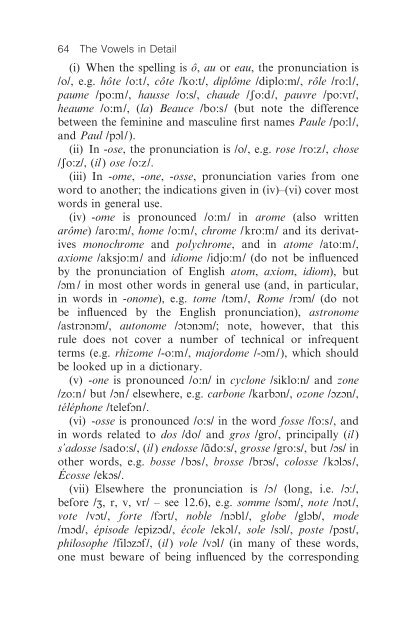An Introduction to French Pronunciation
An Introduction to French Pronunciation
An Introduction to French Pronunciation
You also want an ePaper? Increase the reach of your titles
YUMPU automatically turns print PDFs into web optimized ePapers that Google loves.
64 The Vowels in Detail<br />
(i) When the spelling is ô, au or eau, the pronunciation is<br />
/o/, e.g. hôte /o:t/, côte /ko:t/, diplôme /diplo:m/, rôle /ro:l/,<br />
paume /po:m/, hausse /o:s/, chaude /ʃo:d/, pauvre /po:vr/,<br />
heaume /o:m/, (la) Beauce /bo:s/ (but note the difference<br />
between the feminine and masculine first names Paule /po:l/,<br />
and Paul /pbl/).<br />
(ii) In -ose, the pronunciation is /o/, e.g. rose /ro:z/, chose<br />
/ʃo:z/, (il) ose /o:z/.<br />
(iii) In -ome, -one, -osse, pronunciation varies from one<br />
word <strong>to</strong> another; the indications given in (iv)–(vi) cover most<br />
words in general use.<br />
(iv) -ome is pronounced /o:m/ in arome (also written<br />
arôme) /aro:m/, home /o:m/, chrome /kro:m/ and its derivatives<br />
monochrome and polychrome, and in a<strong>to</strong>me /a<strong>to</strong>:m/,<br />
axiome /aksjo:m/ and idiome /idjo:m/ (do not be influenced<br />
by the pronunciation of English a<strong>to</strong>m, axiom, idiom), but<br />
/bm / in most other words in general use (and, in particular,<br />
in words in -onome), e.g. <strong>to</strong>me /tbm/, Rome /rbm/ (do not<br />
be influenced by the English pronunciation), astronome<br />
/astrbnbm/, au<strong>to</strong>nome /btbnbm/; note, however, that this<br />
rule does not cover a number of technical or infrequent<br />
terms (e.g. rhizome /-o:m/, majordome /-bm/), which should<br />
be looked up in a dictionary.<br />
(v) -one is pronounced /o:n/ in cyclone /siklo:n/ and zone<br />
/zo:n/ but /bn/ elsewhere, e.g. carbone /karbbn/, ozone /bzbn/,<br />
téléphone /telefbn/.<br />
(vi) -osse is pronounced /o:s/ in the word fosse /fo:s/, and<br />
in words related <strong>to</strong> dos /do/ and gros /gro/, principally (il)<br />
s’adosse /sado:s/, (il) endosse /edo:s/, grosse /gro:s/, but /bs/ in<br />
other words, e.g. bosse /bbs/, brosse /brbs/, colosse /kblbs/,<br />
Écosse /ekbs/.<br />
(vii) Elsewhere the pronunciation is /b/ (long, i.e. /b:/,<br />
before /ʒ, r, v, vr/ – see 12.6), e.g. somme /sbm/, note /nbt/,<br />
vote /vbt/, forte /fbrt/, noble /nbbl/, globe /glbb/, mode<br />
/mbd/, épisode /epizbd/, école /ekbl/, sole /sbl/, poste /pbst/,<br />
philosophe /filbzbf/, (il) vole /vbl/ (in many of these words,<br />
one must beware of being influenced by the corresponding












